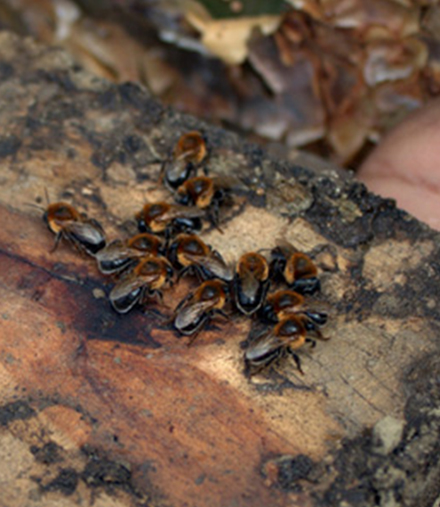
Being sustainable means finding ways to use local resources more efficiently. It also means protecting the natural habitats and diversity of species that share our planet and life all around us. Heifer International is committed to being part of that effort.
Honeybees pollinate more than one-third of the world’s crops and are vital to the food supply. These small insects have a big responsibility to pollinate fruits, vegetables and nuts, increasing food security for farm families. The nutritional value of tasty honey contributes to the overall health of the family farm. Bees do not require feeding; they just need a source of clean, potable water. Bees can forage in a variety of areas, including wild, cultivated, land-mined and arid. Bees are one of the few enterprises that can provide families with much-needed food and income.
Beekeeping has been in practice in Heifer South Africa’s Blouberg Integrated Food Security and Household Farming Project since 2013. The project aims to improve the food and income security of 2,100 families in Blouberg Local Municipality, located in the Capricorn District of Limpopo Province, with 30 of the farmers involved in beekeeping. Beekeeping is making a positive impact on the overall progress of the Blouberg small-scale farming system. Since bees do not require much land, soil fertility is not an issue. They forage on unused natural resources like nectar and pollen.
Beekeeping does not compete for resources needed by livestock and crops. By pollinating farm crops, honeybees increase crop yields. One hive of bees per smallholder farmer can produce roughly 53 pounds of raw honey, and beekeeping has a positive impact on the natural environment. A valuable conservation tool, honeybees allow people to derive economic benefit from indigenous forests and other floral resources in a non-destructive way. A honeybee can typically visit between 50-1,000 flowers in one trip, which can take as little as 30 minutes or as many as four hours. A colony with 25 000 forager bees, each making 10 trips a day, is able to pollinate 250 million flowers (FAO 2009).
Bees provide numerous benefits to the natural environment and play an important role in its sustainability. The role of this small wonder is not readily recognized, Even though they are needed for the pollination of many crops and for maintaining biodiversity. Bees are quite valuable, as they contribute to the successes of agriculture. Without them, farmers would be at a great loss. Around the world, bees have being dying off in droves since the mid-1990s. Colonies have been collapsing mysteriously and adult bees have been disappearing and abandoning their hives. Colony collapse is attributed to a variety of factors, including pathogens, loss of habitat and increased exposure to systematic and other pesticides. Current regulations do not provide adequate protection for bees, but with Heifer’s help, a groundswell of good citizens and small-scale farmers is emerging to protect bees.
Story and photo courtesy of Heifer South Africa